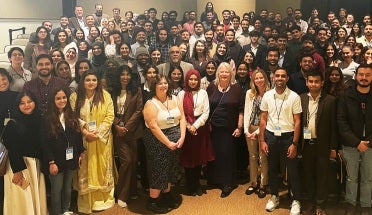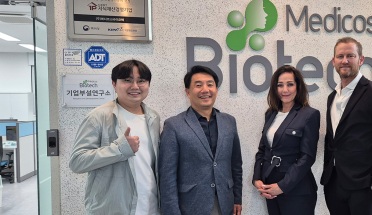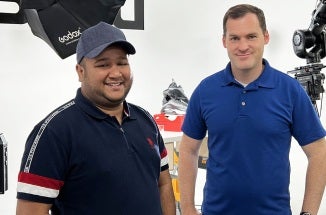
ATX+Singapore Entrepreneur Talks Robotics at SXSW
- May 2, 2023
- Global Innovation Lab
- by Ellen Stader
Ajmal Thahseen wants everyone to have robots — and he wants his company, Doozy Robotics, to build them. With the help of an entrepreneurship program at The University of Texas at Austin, the robotics firm is now closer to achieving its dream.
Launched in 2022 and funded by the U.S. Embassy Singapore through its Small Grants program, the ATX+Singapore Entrepreneurship program supports emerging entrepreneurs by providing training, insight and best practices.
For Thahseen, it’s exactly the type of opportunity Doozy needed. Based in Thahseen’s home country of Singapore with a branch in India, the company operates in Tier 2 and Tier 3 countries across South and Southeast Asia, supplying robots to industries as widespread as hospitality, logistics, manufacturing and health care.
Thahseen notes that robotics can serve any industry: “The moving of materials has been around since time immemorial. If you have a product, you need to move that material.”
A Journey of Constant Adaptation
In addition to trial and error, it took time for Thahseen and his company to arrive at this point. He took his first part-time jobs in computer sales at Samsung, Hewlett-Packard and Dell, then progressed to starting an online import/export company. When he realized the business needed an ecommerce platform, he built his own with a new software company.
These early pivots set the stage for Thahseen’s nimble approach to business, each transition focusing more tightly on the ultimate goal. When he lost his main investor to rivals who were already drawing bigger backers, he again changed the business model, this time to business-to-business software.
The software company’s focus soon morphed into robotics, rising from humble beginnings “with one employee in one small lab.” Early commercial offerings included a social-humanoid robot for the health care industry that could help clients set appointments, guide patients to exam rooms by navigating autonomously to their destinations, and similar tasks.
The company began to hit its stride in 2020. But as Thahseen and his partner, Suresh Chandrasekar, prepared their “minimum viable product” — a prototype that represents a business’ overall capabilities — COVID-19 gutted the markets they hoped to target. As classes moved online, options dried up for selling robots to the educational sector. Hospitals became too busy to implement new technology.
Doozy doggedly identified new growth sectors in manufacturing and logistics, which needed robots to move goods and parts. Soon, the company established a fleet of industrial robots capable of moving objects that weigh from 200 pounds to more than 2 tons.
Mastering the International Markets
Part of Doozy Robotics’ success was in holding tightly to its mission while remaining agile and attentive to market changes.
“Our focus was always to capture a mass audience,” said Thahseen. “Our vision is to build robots for every business and household … so we were ready. We are open to customize or bring the product to each market as affordable and as applicable.”
Thahseen said working in varied markets revealed how differently countries conduct business. For example, in India, consumers are not accustomed to robots in daily life, so the company emphasizes service and support. Conversely, consumers and businesses in Singapore “already know what they want in a robot” and shop for established specifications and price points.
Guidance at Home and Abroad
Amid their constant modifications, the Doozy partners struggled with envisioning the company’s corporate setup, building a team and addressing other fundamentals, so Thahseen looked into business incubators for guidance.
Doozy first joined Singapore’s Pollinate incubator, which serves as the in-country implementation partner for Texas Global’s ATX+Singapore Entrepreneurship program at UT Austin, working alongside advisory partners at Enterprise Singapore and the City of Austin Economic Development Department. Pollinate encouraged Thahseen to apply to ATX+Singapore at UT Austin.
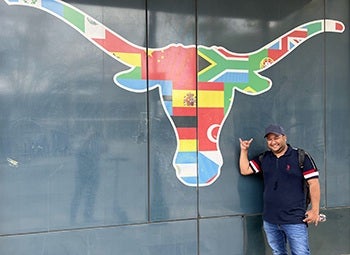
For the program, 10 small to medium-sized businesses in Singapore were selected from among 40 that applied, representing technology and service sectors in robotics, mobile apps, video games, sustainability, and med tech. The participating startups attended a workshop in Singapore, then enrolled in the Texas Global Innovation Readiness® training program and received one-on-one mentoring online from business experts in Austin.
Innovation Readiness is an educational tool created by UT Austin’s Global Innovation Lab. Its nine modules take entrepreneurs through each stage of business development, addressing topics such as market validation, assessing competition and pitching innovations, as well as marketing, protecting intellectual property and more.
Ultimately, as part of the program’s “Shark Tank”-style competition, Doozy Robotics was selected from among the 10 semifinalists to participate in the March 2023 SXSW Interactive Conference, offering Thahseen an opportunity to immerse his company in Austin’s entrepreneurial ecosystem.
Besting the Competition
Gary Anderson, program manager of the Global Innovation Lab, which administers the ATX+Singapore program on the UT Austin campus, offered this insight into Thahseen’s selection as the winning participant: “It’s Ajmal’s passion. He lives and breathes robots.”
Anderson added that Thahseen was clear about his company’s value proposition, from the startup’s goals, markets and business plan to its ultimate vision of success. He had everything he needed to take advantage of the learning and networking opportunities offered. Plus, Doozy was already implementing the concepts being taught in the program curriculum.
Thahseen said he appreciated the program’s thorough outlining of what a fledgling company needs, such as determining costs to address operational needs and acquire customers, and setting price points to turn a profit. He advocated for an approach centered on real-life practice rather than theory, believing a startup should “work out its numbers informed by life lessons.”
Anderson agreed, saying, “Ajmal could teach [the course] now! He’s learned it, and he’s lived it.”
Networking at SXSW and Beyond
True to form, Thahseen arrived at UT Austin and SXSW Interactive with a clear goal in mind: networking.
“I told Gary that I want to meet more service integrators and more robotics companies,” he said. “I asked, ‘Could you help me find a site?’ And of course, we want to meet investors. Networking is all I wanted to do here.”
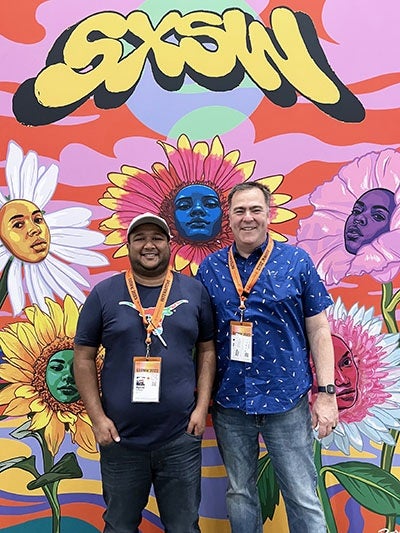
As the conference opened, the pair met with potential investors and made site visits around the area. When Thahseen met with Sisu Robotics just north of Austin in Round Rock, the conversation bloomed with potential.
“They’re basically the service integrator we’re looking for,” said Thahseen.
Thahseen will continue to work with Anderson via ATX+Singapore for the next four months, growing the relationships begun at UT Austin and SXSW, and developing plans to further address the company’s needs as it progresses.
Thahseen summed up his market knowledge, business plan and passion in one statement: “Material movement does seem so niche, but it's mandatory. You don't notice that because there are a lot of people doing it in the background, but it's [a core need] for any business.”


